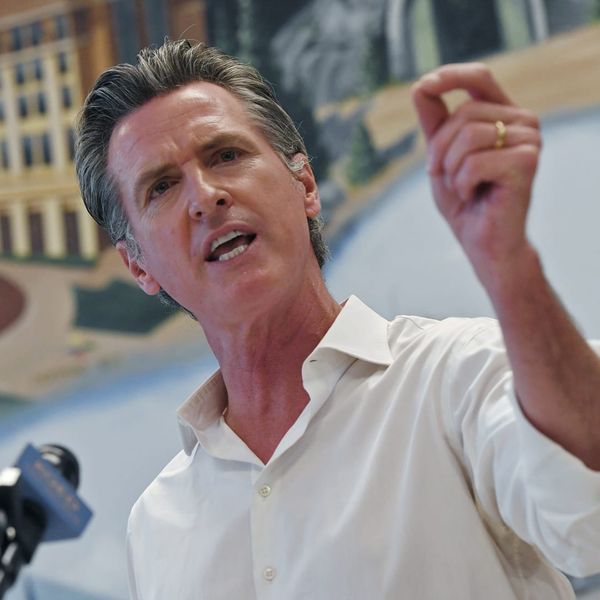
New Jersey just received its ninth credit rating downgrade since Chris Christie became governor. How many would it take for him to sit out the presidential race? Ten? One hundred? Is there any point at which a record to run on becomes a record to run away from? For some candidates, the answer to that appears to be a solid no. Even when failure can’t be spun as anything but failure.
Former Pennsylvania senator Rick Santorum, for instance, lost his bid for a third term in 2006 by a spectacular 17.4 points. That’s not a strong argument for electability, but it didn’t shake his confidence. He not only ran for president in 2012, he won Iowa and 10 other states during the Republican primary season. And now he’s running again.
Several Republicans with equally awkward backstories are brazening it out this year despite the dubious value of promising to do for America what they did for their state or company. They, of course, don’t see it that way — a disconnect that led to a tense exchange recently when Carly Fiorina, CEO of Hewlett-Packard from 1999 to 2005, met the Washington press. In particular, one skeptical Carl Leubsdorf of the Dallas Morning News.
“You have a mixed record, to be charitable about it. A very controversial record,” Leubsdorf told Fiorina at a Christian Science Monitor breakfast. “What is it that you have that would enable you to perform this very difficult job?”
“In business, the numbers and the facts are clear,” Fiorina began, but Leubsdorf interrupted: “The facts aren’t clear. They kicked you out. But you said you laid the basis for future success. So that’s a mixed record.”
A CNN investigation of Fiorina’s HP tenure concluded that she was “a deeply polarizing figure” who displayed questionable management skills as she presided over “layoffs, leadership transitions, and a controversial merger with Compaq” that created an “ugly feud” with the Hewlett and Packard families. She turned up on several lists of worst tech CEOs.
Fiorina nevertheless jumped onto the national political stage. In 2008, she was an economic spokeswoman for Republican presidential nominee John McCain. In 2010, she was the GOP Senate nominee against popular California incumbent Barbara Boxer. And now she plans to announce a presidential bid on May 4.
Louisiana governor Bobby Jindal is another Republican with a controversial record — so much so that some fellow Republicans have attacked him publicly for budget shortfalls, spending cuts, financial gimmickry, and allowing his fiscal policy to be dictated by a national anti-tax lobbying group, Americans for Tax Reform. Two recent polls put Jindal’s job approval rating in the high 20s, but he continues to prepare for a national race and recently announced he had “snagged” the endorsement of Duck Dynasty star Willie Robertson.
And then there are outliers like Ben Carson, retired pediatric neurosurgeon, and Donald Trump, unretired and unrepentant attention-monger, who don’t even have the political experience of a Fiorina.
Christie is in a category by himself. Once a key national player, he now awaits indictments related to Bridgegate, the paralyzing multiday 2013 traffic debacle apparently orchestrated by his close aides as political revenge against a Democratic mayor. Christie himself is not expected to face charges. But his explanation for what happened — that he was too trusting and too willing to delegate responsibility — does not inspire confidence in his management abilities.
His state is in a “weak financial position,” according to Moody’s, and Christie himself scored a career low 38 percent approval rating in a new Quinnipiac University Poll. Nationally, the appeal of his rude, in-your-face political style has faded as voters try to envision it transplanted to the White House. Former Florida governor Jeb Bush and Wisconsin governor Scott Walker, meanwhile, are usurping the affections of the GOP establishment set.
So far Christie isn’t folding. Instead he is trying to pick up the straight-talk torch from John McCain with four detailed policy speeches this spring on entitlements, defense, taxes, and energy. “These are the truths you all know in your gut,” he said in the first one as he suggested hikes in the eligibility ages for Social Security and Medicare and reduced benefits for affluent retirees. History suggests this is not a recipe for political popularity.
What about the Democrats? I can hear you thinking it. So far there’s an official field of one, and while she has striking vulnerabilities, she also has much experience and many selling points. The other Democrats making noises about running are political veterans with defensible records, as are most of the dozen-plus Republicans in the 2016 race or seriously considering it.
The operating principle for the rest seems to be, “why not?” By this time next year, that question will be answered.
Follow Jill Lawrence on Twitter @JillDLawrence. To find out more about Jill Lawrence and read features by other Creators Syndicate writers and cartoonists, visit the Creators Syndicate website at www.creators.com.
Photo: Kim Davies via Facebook








